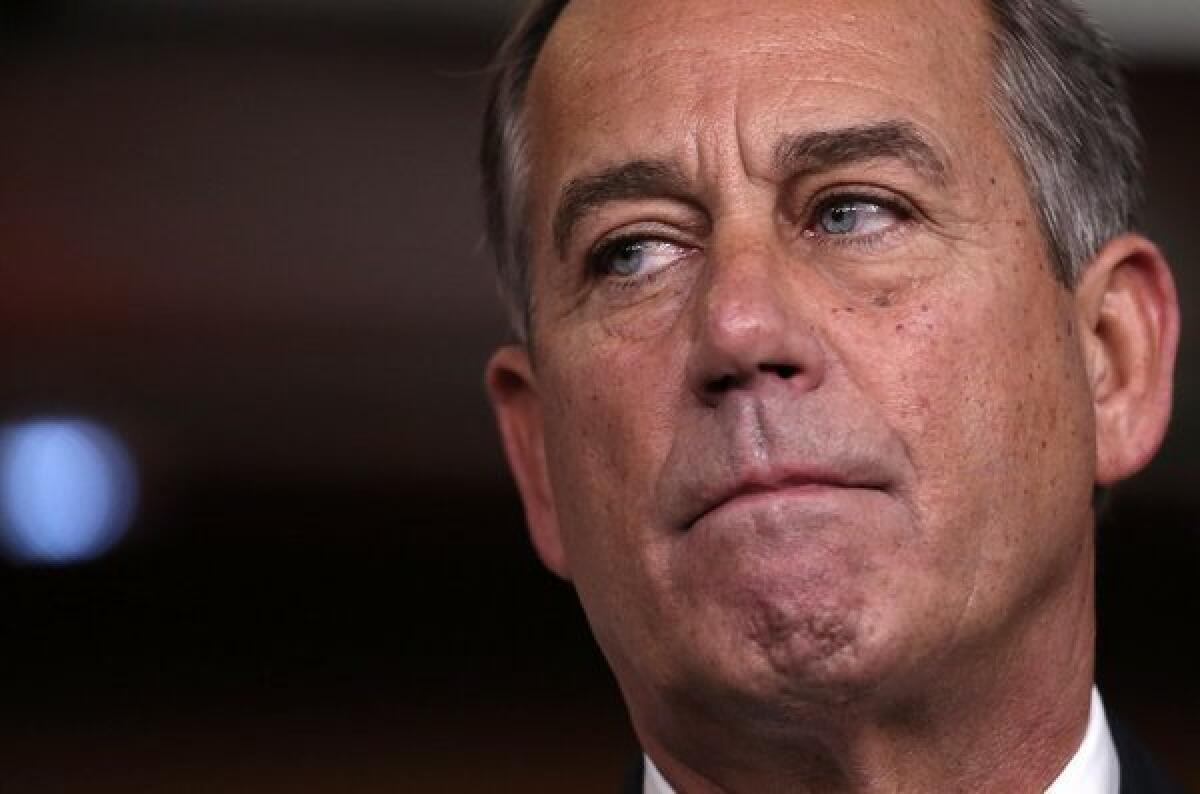Republicans need a ‘Plan C,’ and they need it now

So much for plausible deniability.
The demise of House Speaker John A. Boehner’s “Plan B” prevents Republicans from credibly blaming President Obama if the New Year arrives without a deal to avert the massive, across-the-board tax hikes and spending cuts slated to begin on Jan. 1. That was one of the main goals of pushing Plan B through the House, considering that it wasn’t going to go anywhere in the Democratic-controlled Senate.
What happened on the House floor Thursday seemed like it had been choreographed by Democratic Party strategists. After voting to replace the scheduled across-the-board cuts in defense with cuts to food stamps, foreclosure prevention, disease prevention and a host of other social programs, House Republicans balked at Boehner’s proposal to protect the vast majority of Americans from the looming tax hikes. The problem for dozens of conservatives was that Plan B -- or more formally, the proposed House amendment to the Senate version of H.J.Res. 66 -- would have allowed the Bush tax cuts to expire for those earning more than $1 million (or $500,000, if they were married individuals filing separate returns).
In short, after demonstrating its resolve to curb food aid to struggling Americans, the House GOP couldn’t bring itself to let taxes go up on the wealthy.
Talk about lousy optics. Wall Street certainly wasn’t impressed; the Dow Jones industrial average sank about 1% right after the opening bell Friday.
Many of the dissenters to Plan B no doubt believe that tax increases are the wrong way to go at this stage in the economic recovery. And even if some of them might have entertained the thought of a tax hike, they knew their constituents wouldn’t. So even though Boehner’s proposal staked a position far from the one Obama has been campaigning on for two years -- to wit, letting the Bush tax cuts expire for couples earning more than $250,000 and individuals earning more than $200,000 -- raising anyone’s tax rates was too much of a concession for this faction.
The problem for Republicans now is that they need a grand bargain on the budget more than Obama does. They are, after all, the ones who just stopped the effort to avoid the “fiscal cliff” dead in its tracks. Try as they might to blame the president for insisting on higher tax rates and not offering deeper cuts to cherished entitlements, Obama’s the one who’s made a very public move off the demands he made the centerpiece of his bid for reelection -- a campaign that he won, by the way. With Plan B in ruins, Republicans are left clinging to an absolutist “no tax increases, ever” position even as a self-contorting Grover Norquist offered them a free pass to let at least some of the Bush cuts expire.
Meanwhile, if the negotiations spill over into next year, the GOP’s already reduced leverage plummets further. Tax rates go up automatically on Jan. 1, as a slew of temporary cuts elapse and a higher Medicare tax imposed by the 2010 healthcare law goes into effect. The operative question will thus be, “Whose taxes do we cut to help the economy?” as opposed to, “Whose taxes do we raise to reduce the deficit?” And when it comes to boosting the economy, tax cuts for the wealthy are significantly less effective than those for lower and middle incomes.
Just a few days ago, it seemed that Boehner’s Plan B gambit would help nudge the negotiations with the president along by solidifying the Republican position. It may be quixotic, but it’s conceivable that the immolation of Boehner’s proposal will be just as helpful, albeit in a different way. Instead of persuading the president to make more concessions, the House’s (in)action on Plan B reminds Boehner that the only deal that can pass is one that lots of House Democrats can support. Whether any Republican speaker is willing to accept such a bargain, however, is an open question.
ALSO:
Letters: Gun control back in play
Follow Jon Healey on Twitter @jcahealey
More to Read
A cure for the common opinion
Get thought-provoking perspectives with our weekly newsletter.
You may occasionally receive promotional content from the Los Angeles Times.











